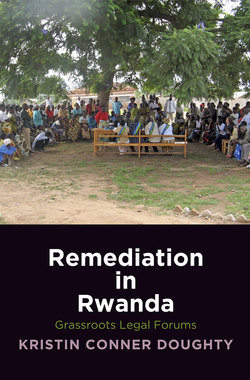Remediation in Rwanda

Реклама. ООО «ЛитРес», ИНН: 7719571260.
Оглавление
Kristin Conner Doughty. Remediation in Rwanda
Отрывок из книги
Remediation in Rwanda
Tobias Kelly, Series Editor
.....
Alphonse’s seemingly total embrace of repentance for the greater good was an exception, as evidenced by the discomfited reactions of the other prisoners seated alongside him. The following chapters show that Rwandans were not simply “pretending peace” (Buckley-Zistel 2009) or “rehearsing consensus” (Ingelaere 2010a) in these forums; rather, they contentiously expressed disagreement with respect to principles of collective cohesion, individual rights, the common good, and ultimately moral community and belonging. The cases I illustrate in the coming chapters, like Beata and Joselyne’s case, involved heated contestation and disagreement rather than straightforward accordance with harmony principles. People situated in a variety of positions alternately enacted mediation principles or contested them at varying moments across a given case discussion, and dynamics of power shifted across moments and in relation to different charges and allegations. Unity in Rwanda was not a dominantly expressed legal ideology among disputants of the kind Nader (1990) and Laurel Rose (1992) have described in other contexts. The two recent ethnographies of postgenocide Rwanda—Jennie Burnet’s Genocide Lives in Us (2012) and Susan Thomson’s Whispering Truth to Power (2013)—both provide rich detail of the sources and expression of disagreements in postgenocide Rwanda, among everyday Rwandans as well as between people and state policy. Thomson explicitly analyzes these disagreements as everyday acts of resistance to the nationwide policy of unity and reconciliation.
I am thus suggesting that we must analyze the historical and political-economic context, to be sure, but not allow it to obscure the smaller-scale interpersonal interactions that make up ordinary life. This argument is consistent with much recent work by anthropologists on warscapes who argue that focusing on violence and the macro-political struggles of war as the “only primary feature” of life in war zones overlooks, as Sharika Thiranagama writes, “myriad mundane (and perhaps more severe for being mundane) experiences of life in protracted war zones,” such as Sri Lanka (Thiranagama 2011:5).29 I suggest here we can extend that analysis to the so-called postconflict period, especially in a context like Rwanda, where, in many people’s perspective and experience, protracted political violence has not ended but has merely transmuted. Stephen Lubkemann has argued, based on work in Mozambique, that exclusive attention to violence and state-level political dynamics, and to interpreting people’s reactions as a response to national-level macro-political struggles, erases attention from the “other struggles” related to “gendered or generational power configurations within households, to seeking socioeconomic advantage, and to the pursuit of redress for personal grievances” (2008:162) that shaped people’s lives during war. Those same dynamics in postgenocide Rwanda, I fear, are overlooked through overemphasis on silencing, coercive effects of state-backed unity programming.
.....